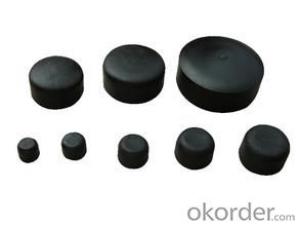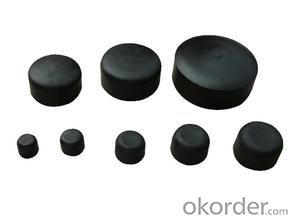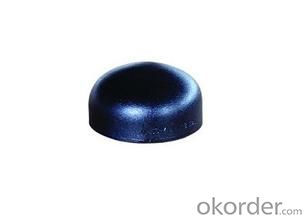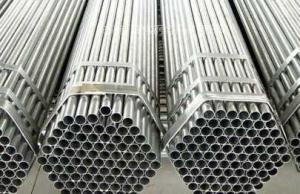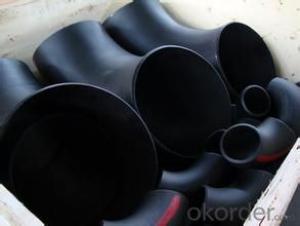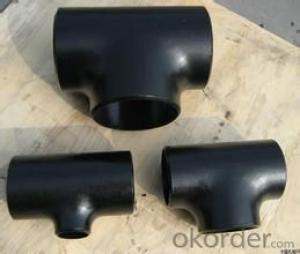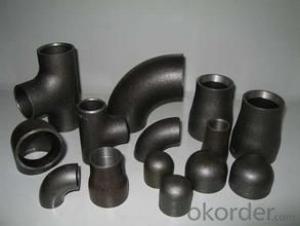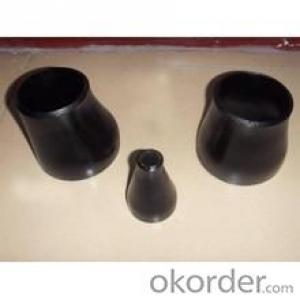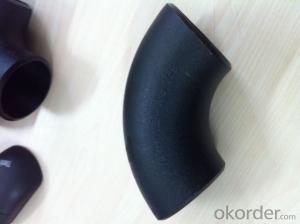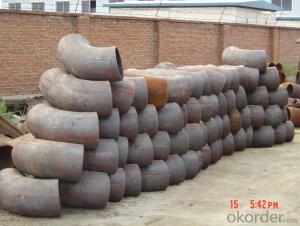CARBON STEEL PIPE BUTT WELDED CAP A235 WPB ANSI B16.9 best price
- Loading Port:
- Tianjin
- Payment Terms:
- TT OR LC
- Min Order Qty:
- 10 m.t.
- Supply Capability:
- 10000 m.t./month
OKorder Service Pledge
OKorder Financial Service
You Might Also Like
Package Of Carbon Steel Butt-Welded Fitting:
PACKED IN PLYWOOD CASES OR PALLETS
Painting Of Carbon Steel Butt-Welded Fitting:
BLACK PAINTING FOR CARBON STEEL
Marking Of Carbon Steel Butt-Welded Fitting:
REFER TO MARKING DOCUMENT or AS PER CUSTOMER REQUEST
Shipping Marks Of Carbon Steel Butt-Welded Fitting:
EACH WOODEN BOX TWO PLASTIC SHIPPING MARKS
Specification Of Carbon Steel Butt-Welded Fitting:
Carbon Steel A234 WPB 90Deg LR Elbow, Tee, Reducer and Cap
Size : 1/2"-48"
Wall Thickness.: SCH10-SCH160, SGP , XS, XXS, DIN ,STD
| Name | ASTM A234 WPB carbon steel ELBOW , tee , reucer, and cap |
| Size | 1/2" - 48" |
| Angle | 45D 90 D 180D |
| Wall thickness | Sch5-Sch160 XXS,STD,XS, SGP |
| Standard | ASME B16.9, GOST 17375-2001, DIN2605 and JIS B2311, EN10253-1 etc. |
| We can also produce according to drawing and standards provided by customers. | |
| Material | Carbon steel pipe fittings , alloy steel and stainless steel. |
| Packaging | Wooden Cases, wooden pallet , or carton box , or nylog bag and then in wooden cases |
| Surface Treatment | Paintting black color , and Shot blasted,anti-rust oil , |
| Delivery Time | 20-30 days, after received advance payment. |
| Quality | First grade |
| Others | 1.Special design available according to your drawing. |
| 2.anti-corrosion and high-temperature resistant with black painting | |
| 3. All the production process are made under the ISO9001:2000 strictly. | |
| 4. A conformity rate of ex-factory inspection of products. | |
| 5. we have export right , offering FOB , CNF CIF price |
STANDARD & MATERIAL GRADE
STANDARD Of Carbon Steel Butt-Welded Fitting
| Standard | Wall Thickness | Type | |
| American Standard | ASME B16.9 | S5S ~ XXS | 45D, 90D, 180D ELBOW, TEE, REDUCER, CAP, STUB END |
| ASME B16.11 | |||
| ASME B16.28 | 90D SR ELBOW | ||
| Japanese Standard | JIS B2311 | SGP ~ LG |
MATERIAL Of Carbon Steel Butt-Welded Fitting
| Carbon Steel | ||
| Material Standard | Material Grade | |
| ASTM | ASTM A234 | WPB |
- Q: What are the standard dimensions for steel pipes?
- The standard dimensions for steel pipes vary depending on the application and industry. However, common sizes range from ½ inch to 48 inches in diameter and have various wall thicknesses based on the required strength and pressure rating.
- Q: How are steel pipes protected against soil movement?
- Steel pipes are protected against soil movement through the use of various techniques such as trenching, backfilling, and proper installation of support structures. Additionally, protective measures like the use of casing pipes or concrete encasement can be employed to prevent direct contact with the soil and minimize the impact of soil movement on the steel pipes.
- Q: What is the maximum length of steel pipes available in the market?
- The maximum length of steel pipes available in the market can vary depending on the specific supplier and industry requirements. However, standard lengths typically range from 20 to 40 feet.
- Q: Are steel pipes suitable for hydronic heating systems?
- Yes, steel pipes are suitable for hydronic heating systems. Steel pipes are known for their durability and strength, making them a reliable choice for transporting hot water or steam in a hydronic heating system. They can withstand high temperatures and pressures, ensuring efficient heat transfer throughout the system. Additionally, steel pipes are resistant to corrosion, which is important in preventing leaks or damage to the pipes over time. However, it is essential to properly insulate steel pipes to minimize heat loss and improve energy efficiency in the hydronic heating system. Overall, steel pipes are a popular and suitable option for hydronic heating systems due to their reliability, durability, and ability to handle the demands of heating water or steam.
- Q: Are steel pipes more expensive than other types of pipes?
- Steel pipes can be more expensive than other types of pipes, but this can vary depending on various factors such as the size, grade, and specific application requirements.
- Q: Can steel pipes be used for fencing or railing?
- Yes, steel pipes can be used for fencing or railing. Steel pipes are durable, strong, and resistant to weather conditions, making them a suitable choice for fencing or railing applications. They provide stability and security while also offering an aesthetically pleasing appearance. Additionally, steel pipes can be easily customized and installed, making them a popular choice for fencing and railing projects.
- Q: What is the difference between steel pipes and cast iron pipes?
- The main difference between steel pipes and cast iron pipes lies in their composition and properties. Steel pipes are made from an alloy of iron and carbon, which gives them high strength and durability. They are also resistant to corrosion and can withstand high pressure and temperature conditions. On the other hand, cast iron pipes are made from molten iron, which provides them with excellent soundproofing capabilities and resistance to fire. However, cast iron pipes are more prone to corrosion and can be brittle, making them less suitable for high-pressure applications.
- Q: Is the electric pipe used with steel pipe or PVC pipe?
- When the electric wire pipe is laid, the steel pipe can be adopted, or the plastic pipe can be adopted, but the steel tube must not be used in the ceiling. The standard explanation is for rat bite.
- Q: How are steel pipes used in the chemical industry?
- Steel pipes are extensively used in the chemical industry for various applications, including transportation of chemicals, gases, and liquids. They are highly durable, corrosion-resistant, and can withstand high pressure and temperature conditions. Steel pipes are used in chemical plants for the transfer of raw materials, intermediate products, and final products within the production process. They are also employed for the distribution of utilities such as water, steam, and compressed air. Additionally, steel pipes are utilized for the construction of storage tanks, reactors, and other equipment in the chemical industry due to their strength and reliability.
- Q: What are the different types of steel pipe nipples?
- Various applications commonly use several types of steel pipe nipples, including seamless, welded, threaded, and grooved. 1. For high-pressure or critical applications, seamless steel pipe nipples are preferred due to their superior strength and reliability. They are manufactured from a solid piece of steel without any seams or joints. Depending on the specific requirements, seamless nipples can be either threaded or plain-ended. 2. Welded steel pipe nipples, on the other hand, are made by joining multiple pieces of steel through welding. They are commonly used in non-critical applications that do not involve high pressure. Welded nipples are available in both threaded and plain-ended options. 3. Threaded steel pipe nipples have external threads at one or both ends, making it easy to connect them to other threaded fittings or pipes. They are commonly used in plumbing, water supply systems, and other applications where a secure and leak-free connection is crucial. Threaded nipples come in various lengths and diameters to accommodate different requirements. 4. Grooved steel pipe nipples feature a groove or indentation around their circumference, allowing for easy installation using grooved couplings. They are commonly used in fire protection systems, HVAC systems, and other applications where quick and efficient installation is necessary. Grooved nipples are available in various sizes and configurations to suit different piping systems. To summarize, there are different types of steel pipe nipples, including seamless, welded, threaded, and grooved. Each type has its own advantages and is suitable for specific applications. It is essential to consider the project's specific requirements and conditions before selecting the appropriate type of steel pipe nipple.
Send your message to us
CARBON STEEL PIPE BUTT WELDED CAP A235 WPB ANSI B16.9 best price
- Loading Port:
- Tianjin
- Payment Terms:
- TT OR LC
- Min Order Qty:
- 10 m.t.
- Supply Capability:
- 10000 m.t./month
OKorder Service Pledge
OKorder Financial Service
Similar products
Hot products
Hot Searches
Related keywords
